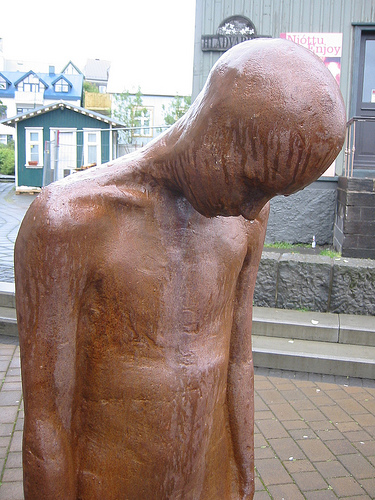By Jed Minor (Editor-in-Chief) – Email
 The recent economic downturn has seen a rise in male depression. This is primarily the result of men losing their jobs and being unable to support themselves or their families. Although male depression due to the loss of jobs is certainly understandable, this latest downturn in male purchasing power is part of a larger trend. The real wage of the North American worker, or the ability of the average worker to buy the necessities of life, has decreased steadily since the late 1970’s. The traditional nuclear family, where a wage-earning male supported his wife and children singlehandedly, is an archetype that developed after WWII, and was based on the fact that men were actually able to support a family on the wage of a low-level factory or office worker. In times past, many working-class families had to have two incomes in order to survive, and in the traditional agrarian model the entire family would work long hours on the farm in order to support themselves.
The recent economic downturn has seen a rise in male depression. This is primarily the result of men losing their jobs and being unable to support themselves or their families. Although male depression due to the loss of jobs is certainly understandable, this latest downturn in male purchasing power is part of a larger trend. The real wage of the North American worker, or the ability of the average worker to buy the necessities of life, has decreased steadily since the late 1970’s. The traditional nuclear family, where a wage-earning male supported his wife and children singlehandedly, is an archetype that developed after WWII, and was based on the fact that men were actually able to support a family on the wage of a low-level factory or office worker. In times past, many working-class families had to have two incomes in order to survive, and in the traditional agrarian model the entire family would work long hours on the farm in order to support themselves.
Depression is often said to be a result of the inability of an individual to accept the reality in which they find themselves. Of course, there are numerous other biological and psychological factors at play in clinical depression, but in the case of this new rise in male depression the cause seems to be men’s desire to return to the ideal of the nuclear family archetype.
We as men have to realize that the nuclear family was created by the postwar boom, and given the circumstances we find ourselves in, it is not likely to return any time soon. There are negative factors which have undercut this ideal, such as the permanent loss of manufacturing jobs in North America and the phasing out of unionized labour, but there are positive ones as well, such as the desire and opportunity women have to work outside the home.
The changing roles of men similarly can have a positive upside as we learn to embrace our nurturing sides as the primary caregivers or in taking on new jobs such as the teaching of young children or taking care of our growing elderly population. Maybe there will come a day when professional athletes thank their dads on TV interviews – probably not, but there is always a hope.


